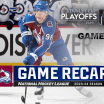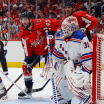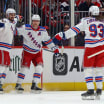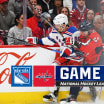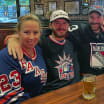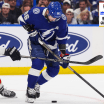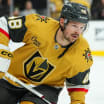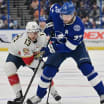Legendary hockey reporter and analyst Stan Fischler is writing a weekly scrapbook for NHL.com this season. Fischler, known as "The Hockey Maven," will share his knowledge, humor and insight with readers each Wednesday.
Today, he takes a look at Hockey Hall of Fame goalie Glenn Hall, whose NHL record of 502 consecutive complete games played is one that appears safe for the ages.
Hall had bittersweet relationship with puck during Hall of Fame career
Pioneer of butterfly goaltending style 'liked everything about hockey, except the game'
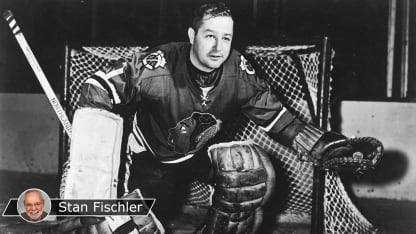
© Getty Images
By
Stan Fischler
Special to NHL.com
"Goalies are a breed apart," Hockey Hall of Fame coach Scotty Bowman once said, "and
Glenn Hall
is apart from the breed."
Bowman, who coached Hall with the St. Louis Blues late in his NHL career, could have labeled his former goalie "inimitable," and the description also would have been a perfect analysis of the man appropriately nicknamed "Mr. Goalie."
Another description that would be right on the money would be "amazing," considering that the native of Humboldt, Saskatchewan, once played 502 consecutive complete NHL games -- none of them while wearing a mask. Goalies today would shudder at the thought of doing that.
"My first priority was staying alive," Hall said. "The second was stopping the puck."
No less extraordinary was the fact that before almost every game, Hall would force himself to vomit. Once his nervous stomach had been cleared he'd take to the ice -- seemingly with minimal enthusiasm, but it was a job.
"I liked everything about hockey," he once asserted with tongue only slightly in cheek, "except the game."
Even as a young player, Hall sensed that he could make a good living stopping pucks. In addition, he got good at it very quickly.
Historian-author Andrew Podnieks appraised Hall well in his 2003 book "Players, The Ultimate A-Z Guide of Everyone Who Has Ever Played in the NHL."
"The reason Hall played all those games without substitution is that he was the best. Hall was, almost without argument, the greatest goalie of them all," Podnieks wrote. "No record is more unbreakable than Hall's. He not only played in every minute of 502 consecutive regular-season games but 50 more in the playoffs. For a goalie to achieve such a streak is superhuman."
Hall made his NHL debut during the 1952-53 season with the Detroit Red Wings and didn't retire until 1971. "I finally quit," he once said after hanging up his pads for good, "because goalkeeping had become dangerous."
Hall's bittersweet relationship with his job gave him plenty of traumatic moments during the era of maskless goalies, most of which he spent stopping pucks for the Chicago Black Hawks (as they were known then). He was in goal for every minute of Chicago's run to the Stanley Cup in 1961, the first for the Black Hawks in 23 years. But playing on a team with a collection of some of the hardest-shooting forwards in the NHL had its drawbacks, most notably at practice.
"We had
Bobby Hull
, one of the hardest shots in hockey history," said Hall, who didn't relent and don a mask until very late in his career, "and I had to face him in every one of our practices.
"The way I'd 'handle' Bobby was to make sure that on certain days I'd just step aside and leave the door wide open. It was a simple matter of self-preservation."
Hall's other prescription for avoiding a nervous breakdown was employing humor. Media types who interviewed Hall over the years relished his quips. Even after a crushing playoff defeat, he could find humor in the game.
Exhibit A was his reaction after the Blues were swept by the Boston Bruins in the 1970 Stanley Cup Final, with Hall victimized by Bobby Orr on the Cup-winning goal in overtime. In one of the most famous photos in sports history, Orr is seen flying through the air, arms stretched out like a plane's wings, after putting the puck past Hall to win the Cup.
When NHL.com's Dave Stubbs once reminded him about the play, Hall replied, "I was showering before Bobby even hit the ice!"
One of the scariest moments in Hall's career took place during a 1957 playoff game between the Red Wings and Bruins. A screened shot by Boston's
Vic Stasiuk
ripped into the Hall's maskless face, knocking him out cold. He awakened in the Olympia Stadium infirmary and squirmed as 23 stitches were embroidered through his lip. Hall finally looked up at the medic and said, "C'mon, doc, get this thing over with, I'm ready to play." And he did.
Asked once which player worried him the most during his nearly two decades in the NHL, Hall singled out Maurice "Rocket" Richard of the Montreal Canadiens. "When the Rocket came flying toward me with the puck on his stick," Hall said, "his eyes were all lit up, flashing and gleaming like a pinball machine. It was terrifying."
Such episodes are what led Hall to describe goaltending as "60 minutes of hell." Yet he still managed to play in 13 NHL All-Star Games, win the Vezina Trophy (then given to the goalie on the team that allowed the fewest goals in the regular season) three times and finish with 407 wins and 84 shutouts, earning induction into the Hockey Hall of Fame in 1975.
Hall was also a trend-setter; he was the pioneer of the butterfly style of goaltending. As Ryan Kennedy of The Hockey News once observed, "In a maskless era when most netminders remained upright on their skates as much as possible, Hall was not afraid to go down on the ice to make a save. His style set a blueprint for future generations after that where the 'Butterfly' became the dominant style."
When those feats were brought to his attention, Hall couldn't resist a squelch. "If you don't think I was familiar with that puck," he said, "then let me tell you exactly what was written on it: Art Ross, Patent No. 22646!"
One night that saw Hall at his best came against the Red Wings, his first NHL team, in Game 6 of the Stanley Cup Final at Olympia Stadium in Detroit on April 16, 1961. He made 21 saves against
Gordie Howe
& Co. in Chicago's Cup-clinching 5-1 win, then was carried off on the shoulders of his teammates.
"It's the least those Hawks could do," one Chicago reporter snapped. "After all, Hall carried them for four years."
Hours later, the winners celebrated in a private suite at Detroit's Leland Hotel. Since I was there to write a magazine piece on Hall, I approached him as he stood quietly in a corner sipping a beer.
While his buddies whooped it up, Hall's calm seemed out of place. As for me, I was excited when I reminded him that it was his first Cup win and the first for Chicago since 1938. A sly grin curled across his face and with total candor, he replied with two little words: "I'm enthused!"
He should have been. After all, Glenn Hall wasn't known as "Mr. Goalie" for nothing.

